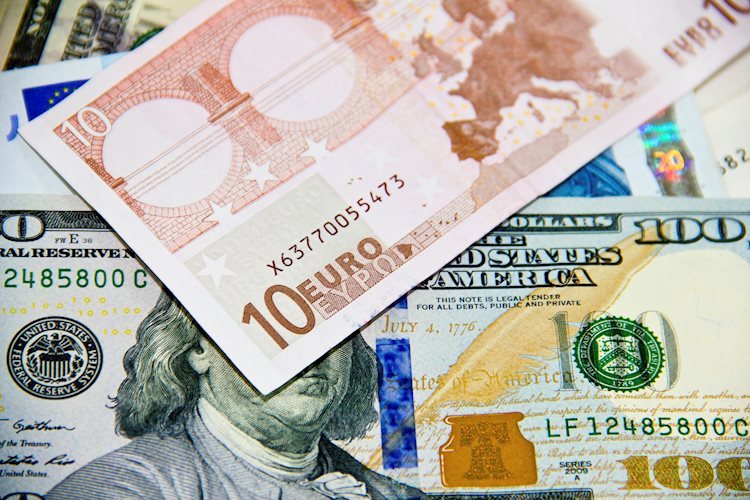Share:
- The Euro gives away some gains vs. the US Dollar.
- European stocks open Friday’s session with decent gains.
- ECB’s Christine Lagarde did not comment on monetary policy.
The Euro (EUR) loses some upside momentum against the US Dollar (USD), prompting EUR/USD to trade slightly on the defensive around the 1.0840 zone at the end of the week.
The Greenback, on the other side of the equation, exchanges ups with downs around 104.40 when tracked by the USD Index (DXY) amidst the continuation of the downtrend in US yields across the curve, while speculation that the Federal Reserve (Fed) might start reducing its interest rates around the spring of 2024 remains well on the rise.
It is worth noting that speculation regarding prospective Fed rate reduction has been heightened as a result of weaker-than-expected inflation indicators (CPI and PPI) announced earlier this week.
In the domestic calendar, final Inflation Rate for the broader euro bloc is expected later in the session.
In the US, Building Permits and Housing Starts will be in the centre of the debate. In addition, FOMC Michael Barr (permanent voter, centrist), Boston Fed Susan Collins (2025 voter, centrist), Chicago Fed Austan Goolsbee (voter, centrist) and San Francisco Fed Mary Daly (2024 voter, hawk) are all due to speak.
Daily digest market movers: Euro remains cautious above 1.0800
- The EUR looks offered vs. the USD early on Friday.
- US and German yields extend the decline at the end of the week.
- Markets believe the Fed will cut rates in the first quarter of 2024.
- For the time being, investors prefer a prolonged delay by the ECB.
- Speculation of FX intervention continue to swirl around USD/JPY.
- ECB’s Villeroy said an impasse in the hiking cycle was fully justified.
- The US housing sector will be in the limelight later in the session.
Technical Analysis: Euro faces an initial barrier at 1.0900
EUR/USD seems to have embarked on a consolidation theme still below 1.0900 for the time being.
Prior hitting the weekly high of 1.0945 (August 30) and the psychological threshold of 1.1000, the next goal of note for EUR/USD is the November top of 1.0895 (November 16). Further north, the pair might confront the August peak of 1.1064 (August 10) and another weekly high of 1.1149 (July 27), both of which precede the 2023 top of 1.1275 (July 18).
Occasionally, the pair may attempt temporary support at the 55-day SMA at 1.0639, before the weekly low of 1.0495 (October 13) and the 2023 low of 1.0448. (October 15).
Looking at the larger picture, the pair’s outlook should remain favourable as long as it stays above the 200-day SMA at 1.0803.
Euro FAQs
The Euro is the currency for the 20 European Union countries that belong to the Eurozone. It is the second most heavily traded currency in the world behind the US Dollar. In 2022, it accounted for 31% of all foreign exchange transactions, with an average daily turnover of over $2.2 trillion a day.
EUR/USD is the most heavily traded currency pair in the world, accounting for an estimated 30% off all transactions, followed by EUR/JPY (4%), EUR/GBP (3%) and EUR/AUD (2%).
The European Central Bank (ECB) in Frankfurt, Germany, is the reserve bank for the Eurozone. The ECB sets interest rates and manages monetary policy.
The ECB’s primary mandate is to maintain price stability, which means either controlling inflation or stimulating growth. Its primary tool is the raising or lowering of interest rates. Relatively high interest rates – or the expectation of higher rates – will usually benefit the Euro and vice versa.
The ECB Governing Council makes monetary policy decisions at meetings held eight times a year. Decisions are made by heads of the Eurozone national banks and six permanent members, including the President of the ECB, Christine Lagarde.
Eurozone inflation data, measured by the Harmonized Index of Consumer Prices (HICP), is an important econometric for the Euro. If inflation rises more than expected, especially if above the ECB’s 2% target, it obliges the ECB to raise interest rates to bring it back under control.
Relatively high interest rates compared to its counterparts will usually benefit the Euro, as it makes the region more attractive as a place for global investors to park their money.
Data releases gauge the health of the economy and can impact on the Euro. Indicators such as GDP, Manufacturing and Services PMIs, employment, and consumer sentiment surveys can all influence the direction of the single currency.
A strong economy is good for the Euro. Not only does it attract more foreign investment but it may encourage the ECB to put up interest rates, which will directly strengthen the Euro. Otherwise, if economic data is weak, the Euro is likely to fall.
Economic data for the four largest economies in the euro area (Germany, France, Italy and Spain) are especially significant, as they account for 75% of the Eurozone’s economy.
Another significant data release for the Euro is the Trade Balance. This indicator measures the difference between what a country earns from its exports and what it spends on imports over a given period.
If a country produces highly sought after exports then its currency will gain in value purely from the extra demand created from foreign buyers seeking to purchase these goods. Therefore, a positive net Trade Balance strengthens a currency and vice versa for a negative balance.
Read the full article here

